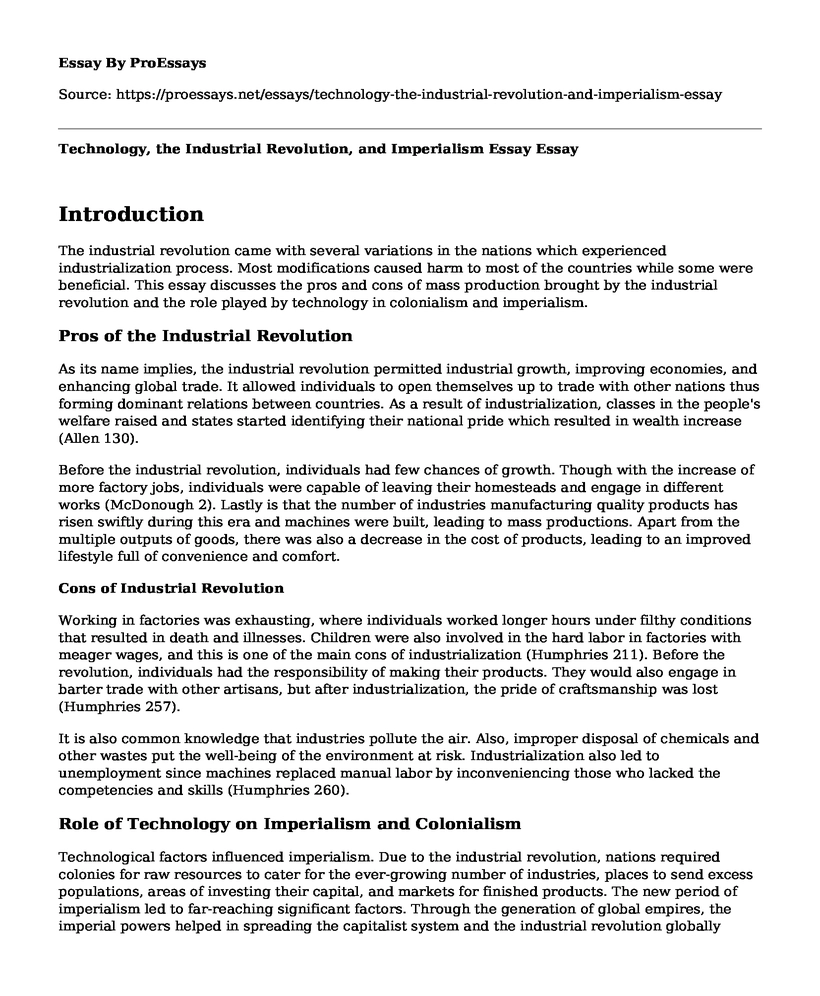Introduction
The industrial revolution came with several variations in the nations which experienced industrialization process. Most modifications caused harm to most of the countries while some were beneficial. This essay discusses the pros and cons of mass production brought by the industrial revolution and the role played by technology in colonialism and imperialism.
Pros of the Industrial Revolution
As its name implies, the industrial revolution permitted industrial growth, improving economies, and enhancing global trade. It allowed individuals to open themselves up to trade with other nations thus forming dominant relations between countries. As a result of industrialization, classes in the people's welfare raised and states started identifying their national pride which resulted in wealth increase (Allen 130).
Before the industrial revolution, individuals had few chances of growth. Though with the increase of more factory jobs, individuals were capable of leaving their homesteads and engage in different works (McDonough 2). Lastly is that the number of industries manufacturing quality products has risen swiftly during this era and machines were built, leading to mass productions. Apart from the multiple outputs of goods, there was also a decrease in the cost of products, leading to an improved lifestyle full of convenience and comfort.
Cons of Industrial Revolution
Working in factories was exhausting, where individuals worked longer hours under filthy conditions that resulted in death and illnesses. Children were also involved in the hard labor in factories with meager wages, and this is one of the main cons of industrialization (Humphries 211). Before the revolution, individuals had the responsibility of making their products. They would also engage in barter trade with other artisans, but after industrialization, the pride of craftsmanship was lost (Humphries 257).
It is also common knowledge that industries pollute the air. Also, improper disposal of chemicals and other wastes put the well-being of the environment at risk. Industrialization also led to unemployment since machines replaced manual labor by inconveniencing those who lacked the competencies and skills (Humphries 260).
Role of Technology on Imperialism and Colonialism
Technological factors influenced imperialism. Due to the industrial revolution, nations required colonies for raw resources to cater for the ever-growing number of industries, places to send excess populations, areas of investing their capital, and markets for finished products. The new period of imperialism led to far-reaching significant factors. Through the generation of global empires, the imperial powers helped in spreading the capitalist system and the industrial revolution globally (Magdoff 266).
During the industrial revolution era, one invention resulted in another idea, and the cycle continued, and this led to the modern world. Imperialism brought about by industrialization was significant to the political power of several states for the Western and Easterners (Goldstone 325). It increased military strength and added wealth. Advanced communication, weapons, and military training made conquering other nations easier. With the power of technology in improving military tools, the countries were able to uphold their authority globally by applying their colonies as fortifications and supply bases.
Conclusion
In conclusion, we see that the industrial revolution was an era in history when humanity discovered efficient and innovative ways of producing goods, creating new transportation methods, and manufacturing services. This change revolutionized the functioning of the Market system as well as the perception of people towards their social status and their necessities. Nevertheless, the price that humanity was forced to pay for the emergence of mass production brought by industrial revolution highly outweighed its rewards.
Works Cited
Allen, Robert C. The British industrial revolution in global perspective. Vol. 1. Cambridge: Cambridge University Press, 2009.
Goldstone, Jack A. "Efflorescence's and economic growth in world history: rethinking the" Rise of the West" and the Industrial Revolution." Journal of world history (2002): 323-389. Accessed from https://www.jstor.org/stable/20078976
Humphries, Jane. Childhood and child labor in the British industrial revolution. Cambridge University Press, 2010.
Magdoff, Harry. Imperialism: From the colonial age to the present. NYU Press, 1978.
McDonough, William, and Michael Braungart. "The next industrial revolution." The AtlanticMonthly 282.4 (1998). Accessed from https://www.ratical.org/co-globalize/nextIndusRev.pdf
Cite this page
Technology, the Industrial Revolution, and Imperialism Essay. (2022, Oct 03). Retrieved from https://proessays.net/essays/technology-the-industrial-revolution-and-imperialism-essay
If you are the original author of this essay and no longer wish to have it published on the ProEssays website, please click below to request its removal:
- Research Paper Sample on Organic Photovoltaic Devices - a Renewable Energy Source
- Levitsky and Way vs. Diamond Debate: Democracy in Recession
- Critical Essay on "I Have a Dream" Speech by Dr. Martin Luther King Jr
- Compare and Contrast Paper on Nationalism and Imperialism
- Essay Sample on Exploring the Balance Between Capitalism & Socialism in The United States
- Essay Sample on US Fracking Boom: Benefits and Hazards
- The City of Baghdad and Constantinople - Essay Sample







